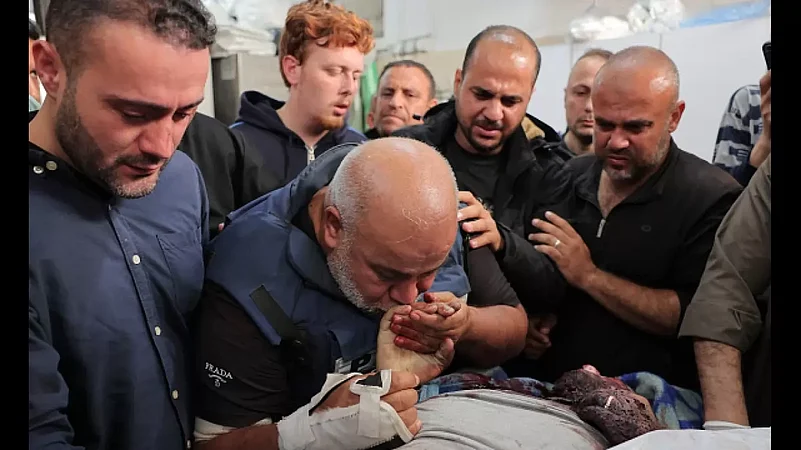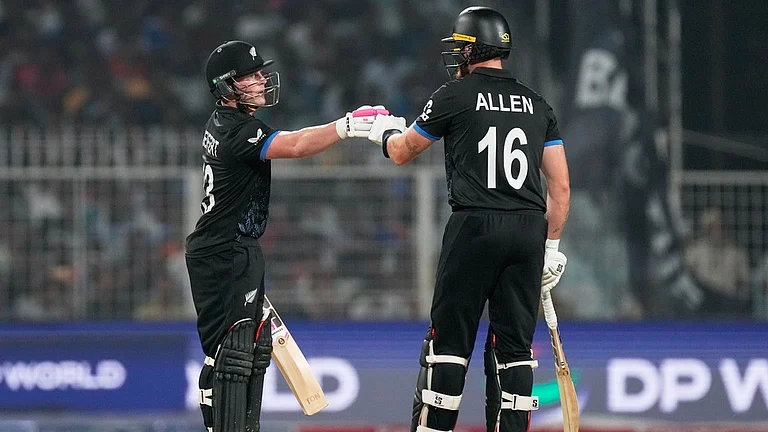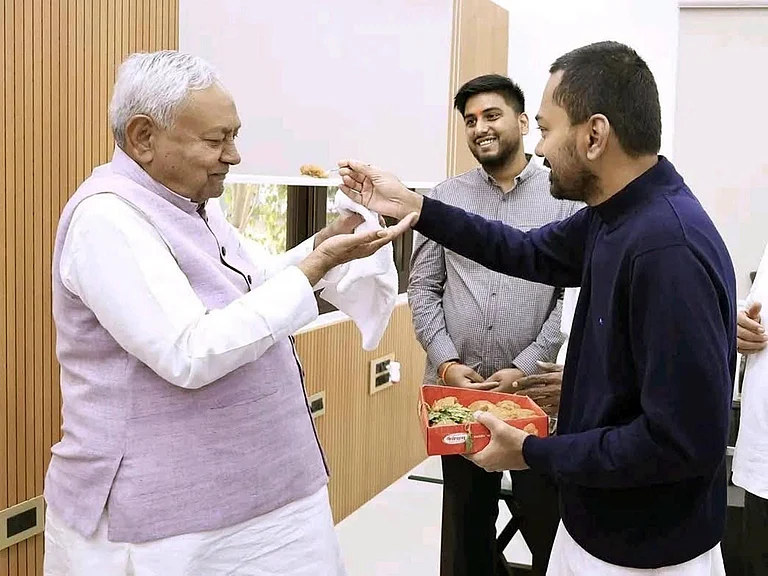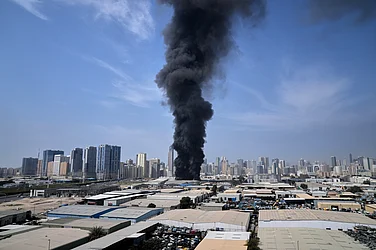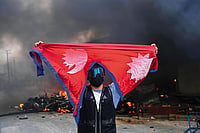“Help us to stay alive….” Those were the last few words of 15-year-old son Mahmoud and seven-year-old daughter Sham's message on social media, days before they were killed along with their mother and eight relatives by Israeli airstrikes in Gaza. They were the immediate family of the Al Jazeera bureau chief Wael Al-Dahdouh, a 53-year-old journalist with years of experience in conflict reportage.
Visuals of a shattered Dahdouh clutching the white cloth-wrapped shrouded body of his daughter with a bloody face soon went viral. The family was killed on October 28 in what was termed a “targeted” attack by the Israeli forces over Dahdouh’s reportage on Israel’s genocide in Gaza. They were reportedly living in the UN-recognised Nuseirat refugee camp in central Gaza, which was called a “safe area” by Israeli forces, after fleeing their home following initial bombings.
Three months after the tragedy, Hamza Dahdouh, the eldest son of Wael Al-Dahdouh was killed by an Israeli missile strike in the western part of Khan Younis, Gaza. Hamza along with another journalist, who too lost his life, in the “targetted” attack was travelling near al-Mawasi, a supposedly safe area towards the southwest, when their vehicles were struck. The journalists were on their assignment to speak to civilians who were previously displaced by the bombings.
Hamza was a Palestinian journalist and camera operator with Al Jazeera. He was just 27 and like his father, Wael Al-Dahdouh, his efforts were all focused on the 24-hour coverage of the Israel genocide in Gaza for the Arabic news portal.
Who is Wael Al-Dahdouh?
Wael Hamdan Ibrahim Al-Dahdouh, a Palestinian journalist, has been the face of Al Jazeera’s 24-hour coverage of this war and previous rounds of fighting for millions of Arabic-speaking viewers across the region, nearly always appearing on air in the blue helmet and flak jacket worn to identify journalists in the Palestinian territories.
Following the death of his fourth son, Dahdouh broke down in front of the camera. He said, “Hamza was not part of me, he was all of me.” As he bid farewell to yet another child of his, he added, “To Hamza and to all the martyrs I say we will remain faithful. This is the road that we have chosen consciously. We have offered much, we have offered a lot of blood because this is our destiny. We shall continue.”
Dahdouh was reporting on the offensive in late October when he received word that his wife, daughter and another son had been killed in an Israeli airstrike. His grandson, wounded in the same strike, died hours later. The Qatar-based broadcaster later aired footage of him weeping over the body of his son while still wearing his blue press vest.
But after the killing of Hamza, Dahdouh’s vigour to continue his unabated reportage on Israel’s bombings seems to have risen.
Despite the pain of losing his family, al-Dahdouh told an NBC News crew in Gaza that he would not stop reporting. “The pain of losing someone is indeed very difficult and when it is about your eldest son after the death of the family, then it becomes even more difficult,” he said. “In the end, this does not change anything of reality, and will not change any of our decisions. We are going to proceed as long as we are alive and breathing. As long as we are able to do this duty and deliver this message.”
Dahdouh’s career in journalism began in 1998 with the Palestinian newspaper Al-Quds newspaper where he was a correspondent in Gaza. Simultaneously, he also worked for other Palestinian magazines and worked as a correspondent for the radio Voice of Palestine. During the second Intifada in 2000, he worked for Sahar satellite channel and later worked as a correspondent for the Al Arabiya in 2003.
His stint with Al Jazeera began in 2004 when he started working as a reporter in the office in the Gaza Strip,
Born on April 30, 1970, in the Zaytoun neighbourhood, the oldest neighbourhood of Gaza City in the Israeli-occupied Gaza Strip, Dahdouh grew up in a well-off Gazan family, whose origins are from the Arabian Peninsula.
After receiving his education from several schools across the Gaza Strip, he spent seven years in Israeli prison immediately after obtaining his high school diploma in 1988. During his prison years, he received his second diploma and a decade later, he completed his graduation in journalism from the Islamic University of Gaza. Further, he wanted to move abroad to complete his master's. However, after Israeli authorities prevented him from moving, he received a master's degree in regional studies from Al-Quds University, Abu Dis, in 2007.
With over two decades of covering the oppression in Palestine, Dahdouh has been on the frontline to bring out the voices of civilians from Gaza and the West Bank. Although the death of his family members has broken him down, he has not resigned from his duties. Instead, he says, “The whole world must look at what is happening here in the Gaza Strip. What is happening is a great injustice to defenseless people, civilian people. It is also unfair for us as journalists.”
The Committee to Protect Journalists says at least 70 Palestinian reporters, as well as four Israeli and three Lebanese reporters, have been killed since Hamas’ October 7 attack triggered the genocide in Gaza and an escalation in fighting along Israel’s border with Lebanon. Over 22,800 Palestinians have been killed in the war, mostly women and minors, according to the Health Ministry in Hamas-ruled Gaza, which does not differentiate between civilian and combatant deaths. Some 1,200 people, mostly civilians, were killed in Israel during the initial Hamas attack.


